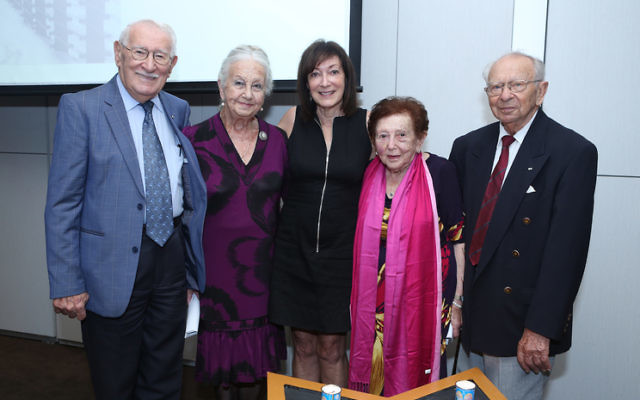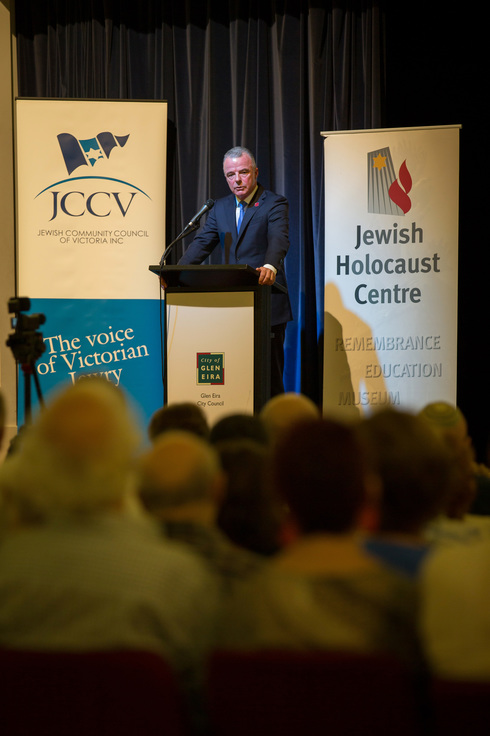Survivors and leaders mark Holocaust Remembrance Day
International Holocaust Remembrance Day (IHRD) was marked with poignant and moving commemorations in Sydney and Melbourne on January 28.

INTERNATIONAL Holocaust Remembrance Day (IHRD) was marked with poignant and moving commemorations in Sydney and Melbourne on January 28.
More than 400 people gathered at Glen Eira Town Hall in an event hosted by the Jewish Holocaust Centre (JHC) and the Jewish Community Council of Victoria (JCCV), including members of parliament, representatives of embassies and consulates, local government councillors, and the general public.
In his keynote address, director of the Australian War Memorial Dr Brendan Nelson, declared: “In commemorating the dead, we are inspired by the triumph of the human spirit given us by those who survived.”
In late 2016, Nelson personally oversaw the opening of “The Holocaust: Witnesses and Survivors”, the first permanent Holocaust exhibition integrated into the Australian War Memorial. Nelson recounted his shock in learning that until this point, the Holocaust narrative had been relegated to the margins, told through the lens of “seven small images”.
He made it his mission to ensure that these years of “genocidal barbarism” were memorialised by presentating stories of survivors who made their new lives in post-war Australia.
“It is education more than anything else that is likely to protect us from ideas and attitudes deeply rooted in ignorance and prejudice,” said Nelson.
“In a world grappling with the mass movement of people; the persecution of political, ethnic and religious minorities; the push for euthanasia; and a generational struggle against resurgent totalitarianism principally in the form of Islamic extremism, we must remind ourselves not only of why we fought wars but that of which human kind is capable and the circumstances that lead to it.”
Moshe Fiszman is only too aware of these circumstances.
The 96-year-old shared his own story at the event: from his birth place in Radom, Poland, “to the Nazi hellholes of Majdanek, Auschwitz-Birkenau, Natzweiler-Struthof, Vaihingen and Dachau”.
“They took our homes, our possessions, our clothes, our shoes, even our hair. When we spoke, no one listened. And if they listened, they did not understand.”
“Yes – they took our names, our identities – and, for those of us who survived, our loved ones,” he added.
In Sydney, candle lighting and powerful addresses by Holocaust survivors and longtime volunteer guides Yvonne Engelman, Kuba Enoch, Olga Horak and Eddie Jaku set the tone for touching and thought-provoking ceremony held at the Sydney Jewish Museum.
Each spoke of their experiences of liberation and life after the war at the service, which also fell on the anniversary of the liberation of Auschwitz.
Australian Association of Jewish Holocaust Survivors and Descendants president Peter Wayne, the museum’s president Professor Gus Lehrer and Rikki Gold, representing the third generation of survivors, were also guest speakers.
Prime Minister Malcolm Turnbull and Opposition Leader Bill Shorten issued statements of reflection on the significance and meaning of the day.
Turnbull said, in examining the history of the Shoah and the roots of prejudice, intolerance and hate, “we do so in the hope its lessons are never lost and with the determination that we must do all we can to ensure such tragedies never again occur”.
“Australia’s recent acceptance as a liaison country in the International Holocaust Remembrance Alliance further strengthens that commitment, and I look forward to Australia becoming a full member in due course,” he said.
Shorten said “we must never forget the lessons of history’s most atrocious crime – that hatred and division must never be allowed to go unchecked and unchallenged”.
“We also pay tribute to those who sought shelter and a new life in Australia, and in the decades since have contributed so much to building our nation.”
REBECCA DAVIS AND SHANE DESIATNIK


comments